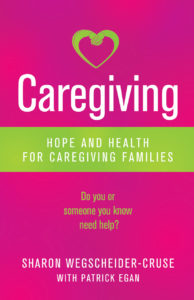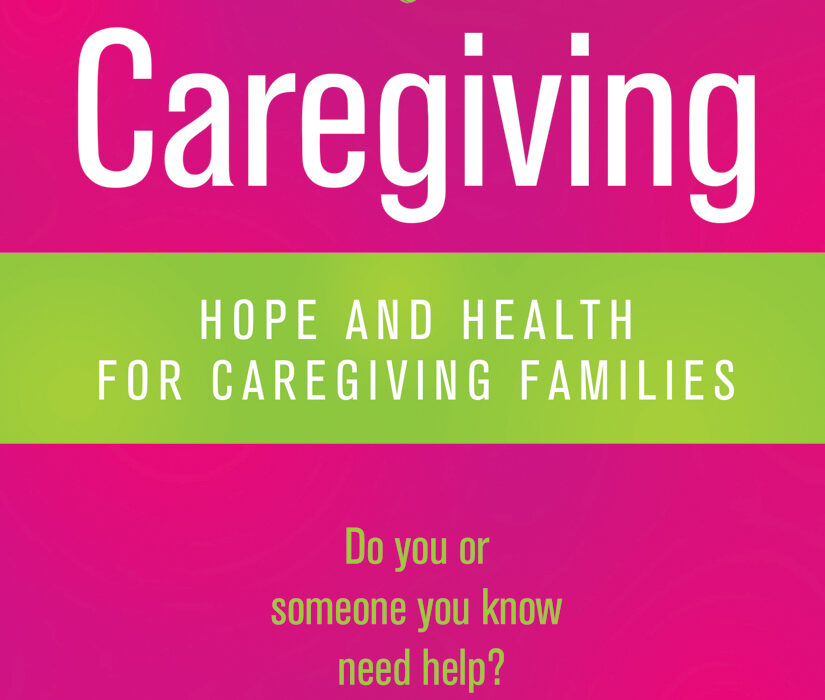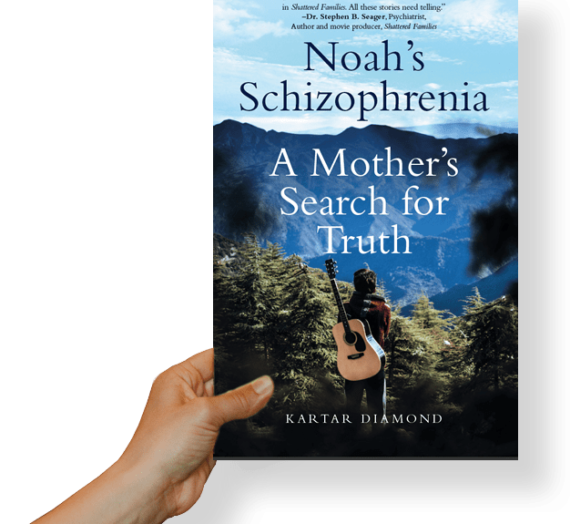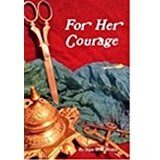CAREGIVING
Hope and Health for Caregiving Families
Sharon Wegscheider-Cruse with Patrick Egan
A comprehensive guide to help make sense of the caregiving puzzle.
After a life-threatening accident stopped her completely in her tracks a few years
 ago, author Sharon Wegscheider-Cruse and her family came to truly understand that we
ago, author Sharon Wegscheider-Cruse and her family came to truly understand that we
are all one event from a lifestyle change. Former First Lady Rosalyn Carter clearly
illustrated the importance of this when she said: “There are only four kinds of people in
this world: those who have been caregivers; those who currently are caregivers; those
who will be caregivers; and those who will need caregivers.” Hence, the new book by
Cruse with Patrick Egan has arrived, Caregiving: Hope and Health for Caregiving
Families (ISBN: 9780757321931 – May 2019 — $14.95). While some people choose to
take care of loved ones after they can no longer take care of themselves, many others
must do so for a myriad of other reasons, often financial. It can be a crisis situation,
such as an accident, or the long-term effects of aging. In any case, the days are often
long and draining, both for the family caregiver and the paid professional, and the
choices to be made are often confusing, difficult, and daunting.
In this illuminating book filled with practical, easily implementable advice,
Wegscheider-Cruse helps readers sort through the puzzle that forms the caregiving
world. Chapter topics include: identifying the roles of caregivers; how to deal with
burnout; finding ways to compartmentalize and separate without guilt; using technology
to make life easier; building bridges through teamwork; downsizing; and navigating
end-of-life issues. Most importantly, the book offers readers a deep toolkit of invaluable
suggestions for navigating tough issues with positivity and optimism. It is also the first
book to provide stories from the perspective of not just the caregiver, but the caree, thus
enabling caregivers to better understand their fears and feelings. The result is a positive,
unified approach to care.
ABOUT THE AUTHORS
Sharon Wegscheider-Cruse is the founding Chairperson of the National Association
of Children of Alcoholics, and founder of Onsite Workshops. She has brought hope and
healing to millions as an author, counsellor, trainer, consultant, and lecturer. She has
written 19 books translated into 13 languages, and broke ground and fostered a
movement with her works, Another Chance: Hope and Health for the Alcoholic Family
and Learning to Love Yourself. Sharon has traveled the world and developed programs
in the United States, Europe, Australia, and Canada, and has appeared on The Phil
Donahue Show, The Oprah Winfrey Show and The Larry King Show, as well as in
multiple media events.
Patrick Egan is a caregiving “gentrepreneur” who lives in Boulder, CO, and is the
caregiver for his parents who live in a senior community nearby. He is the founder of
NurturingNet, a company that helps others use technology in a way that enhances and
adds fun to the caregiver experience. Prior to this, he served as VP of Human Resources
for the Global HealthCare Exchange, created by industry-leading health care firms
including Medtronic, GE, Johnson and Johnson, Abbott and Baxter International. He
holds a BA in Communications from the University of Colorado and an MBA in
Management from the College of St. Thomas.
AVAILABLE at Amazon
Caregiving: Hope and Health for Caregiving Families
AUTHOR INTERVIEW
1. How important is the subject of caregiving?
There are an estimated 44 million unpaid caregivers (mostly family members) in the US
alone. Millions more in caregiving professions (nurses, counselors, clergy, social
workers etc.)
2. How does caregiving start in these families?
Sometimes the need for caring comes on in an instant, an accident or crisis of some
kind. Sometimes the care needs come on slowly, aging issues, some kinds of dementia
or diagnosis (Parkinsons, MS, cancer etc.)
3. Who needs to be considered in families when care taking begins to
happen?
There are two considerations physically, financially, emotionally etc. One is the person
who needs care and the other are the people who are trying to help. This book gives a
clear and easy to understand picture of the caregiving crisis that is facing this country.
What the person being cared for needs and feels, what the caregiver needs and feels and
how we are all connected. It’s a language and an overview that ties everything together.
4. Why is your book different from all the rest of the books on Caregiving?
This book gives a clear and easy to understand picture of the caregiving crisis that is
facing this country. What the person being cared for needs and feels, what the caregiver
needs and feels and how we are all connected. It’s a language and an overview that ties
everything together .
5. What part of your book do you think everyone needs to read.
The toolbox chapter. Everyone needs all the help they can get.
6. Why does technology matter in a book about caregiving?
The world is moving fast in the direction of the need for caregiving. Technology can
help both the person doing the caregiving and the people who are cared for and bring
hope and help to all.
7. Why is the section on families so important?
Families either grow together or run the risk of separating in the stress and work of
caregiving.
8. Why should agencies, corporations, funding sources and actual
caregivers work together?
We have so many people trying to do so much and are so overwhelmed and exhausted
too much of time. Building bridges is the foundation on which relief can come to meet
the needs of everyone. The chapter on bridge building brings hope,
9. As our population grows older and the problems that come with “need”
as people live longer and closer together, will caregiving issues only
increase?
Yes, caregiving is the topic of “now” and “will be” the topic of the future of all of us.
10. Is there anyway out of the “caregiving crisis”?
Yes, the more we all talk, listen and share, the more help and hope we will have and
find more global answers to each person’s personal need.
PRAISE FOR CAREGIVING
“The opposite of love, is not hate… it is fear. Sharon Cruse has been a visionary leader
for more than 30 years, teaching caregivers how to set healthy boundaries with those we
assist, so we need not fear losing ourselves in the process of caring for them. She shares
her clarity, her stories, and usable tools to help us create a kinder, more caring world for
all of us. This book is her latest and most needed contribution.”
—Dr. Pater Alsop, PhD, CET, lecturer, humorist, songwriter, parent
“Sharon Wegscheider-Cruse, world-famous author and trainer, continues through her
own life experiences to grow emotionally and spiritually. She finds the words to be a
leader one more time, addressing a significant passage of life that we will all be
facing—the need for caregiving or to be that caregiver, and often both. As always, she
takes the journey with the reader.”
—Claudia Black, PhD, author, addiction and family trauma specialist, Senior Fellow
at The Meadows addiction and psychiatric treatment program
“Sharon has always been a pioneer, forging new trails that change the destiny of
generations of innumerable souls. This book represents the next chapter of that journey.
Patrick is a warm gentle soul who is inspiring an entire generation to bring
consciousness to a special kind of love and caring for others.”
“Sharon’s new book is a simple and concise guide that provides a common language
about caregiving in an easy to understand way. With a clear focus on self-care, she
offers a heartfelt road map to face daily challenges in a healthy, balanced fashion.
Caregiving: Hope and Health for Caregiving Families is a must read for all families.”
—Jerry Moe, MA, National Director of Children’s Programs, Hazelden Betty Ford
Foundation
“Sharon Wegscheider-Cruse has mentored families and professionals for decades in the
art of self-care, choice-making, and negotiating intimate, professional, and extended
family relationships. She now guides us along the intensely vulnerable experience of
giving and receiving care as we walk into the light and darkness of physical and mental
extremity. Sharon has led by her lifelong example of giving and receiving loving care.
Giving voice to our often silent inner pain, Sharon again gently lights the way to
respectfully walking through the last steps of our journey with those we love.”
—Carol D. Sexton, MD, American Board of Psychiatry and Neurology
“Sharon has been both a giver and receiver of significant care over the years. In each
chapter of her new book, she has stories as well as skills and perspectives that might
assist all of us become better givers and receivers of caring.”
—Robert Moran, PhD, Professor Emeritus, author of many books including Managing
Cultural Differences
“Sharon Cruse has been a given a wonderful gift. It is her ability to analyze complex
feelings and behaviors and then communicate ways to live a more healthy and
productive life in an easier, more understandable way. As each generation lives longer,
it is crucial that we have the specific tools we need to handle the many challenging days
that may come our way as we care for family and friends. We need to balance caring for
others and taking care of ourselves at the same time. The caregiver must stay as healthy
and strong as possible.
“Patrick Egan has been and is a loving caregiver to his parents, making it possible for
them to ‘age in place.’ His vision with technology and useful tools for seniors makes his
contribution significant. He is able to take the abstract and simplify it to manageable
and usable information, especially for seniors.”
—Sandy Coletta, MA, teacher
“Sharon is a lifelong giver and learner wrapped in wisdom and love. Her skillful writing
is passionate—filled with real-life, compelling, and instructive stories.
She and her gifted son, Pat, speak as a unique team of professionals from years of multi-
dimensional caregiving experiences—now ready to share their gifts of cutting-edge
strategies with fresh perspectives for the demands of everyday caregiving.”
—Jack Williamson, U.S. Air Force Chaplain, Colonel (retired), former Executive
Director for the National Conference on Ministry to the Armed Forces and Veterans
Affairs Chaplaincy, Director of InterGen Impact—a University of Colorado
Intergenerational Writing Course
“Who better than Sharon Wegscheider-Cruse and her son, Patrick Egan, to combine the
practical and personal stories that bring wisdom and relief to those of us who experience
the universal role of caregiver. We are not alone.”
Views: 242



larescoe
This is such an informative post, thank you so much for sharing! This is definitely something that scares me but I would rather be prepared for than not.
Debbie P
Thanks for this article because it is a very important topic.
Nancy P
It’s important that caregivers also get support.
MsRedK
I was once very sick and had to be taken care of and now I’m taking care of my mom. It takes a lot out of you no matter what role you are!
Mia E.
Many of my friends are in situations where they are caregivers to aging parents so I appreciate how important this topic is.
tat2gurlzrock
I haven’t been in this situation but I have friends that have. Great article!
Penny Branson LeBaron
I need to read this. It is so easy to get burned out
Brittany Gilley
very informative, thanks
Abigail Gibson
I can relate I am so caring all the time
Jodi Hunter
Thanks for all the information.
megan allen
Thank you so much for sharing this very important information!